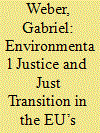|
|
|
Sort Order |
|
|
|
Items / Page
|
|
|
|
|
|
|
| Srl | Item |
| 1 |
ID:
181062


|
|
|
|
|
| Summary/Abstract |
The European Union (EU) is globally recognised as a sustainability leader and has implemented various climate policies such as the European Green Deal. However, it is also one of the largest importers of fossil fuel resources from developing countries, as in the case of coal from Colombia. From a political ecology and environmental justice perspective, it is possible to argue that the EU has benefited for many years from cheap Colombian coal, while the local population has suffered from the related social and environmental impacts. Colombia and Europe are connected not only through ‘ecologically unequal exchanges’, but also through anti-coal activist networks, which highlights the challenges ahead for the EU and its (former) suppliers of fossil fuels in terms of sustainability transitions.
|
|
|
|
|
|
|
|
|
|
|
|
|
|
|
|
| 2 |
ID:
179672


|
|
|
|
|
| Summary/Abstract |
The European Green Deal calls for a revision of the Regulation on guidelines for trans-European energy infrastructure (TEN-E Regulation). The focus of the TEN-E Regulation was on accelerating the development of strategically important projects linking energy networks across the EU, labelled as Projects of Common Interest (PCIs). We provide seven recommendations on how to revise the Regulation to align it with the new full decarbonisation objective. We split the analysis in three parts: the eligibility, selection and cost allocation of PCIs. Regarding eligibility, first, oil networks should be excluded, while the case of gas networks is debatable. Second, power-to-X technologies, electric charging infrastructure and (smart) gas distribution grids could be added to the scope. Regarding selection, first, the Ten-Year Network Development Plan (TYDNP) should be integrated over all energy vectors using an open-source model. Second and third, the scenarios used in the TYNDPs should be subject to the European Commission's approval, while the approval decision for cost-benefit analysis methodologies should be reallocated from the Commission to ACER. Finally, regarding cost allocation, first, cross-border cost allocation decisions should leave all involved jurisdictions with similar benefit-to-cost ratios to increase commitment. Second, affordability should be the only award criterion for European funding.
|
|
|
|
|
|
|
|
|
|
|
|
|
|
|
|
|
|
|
|
|